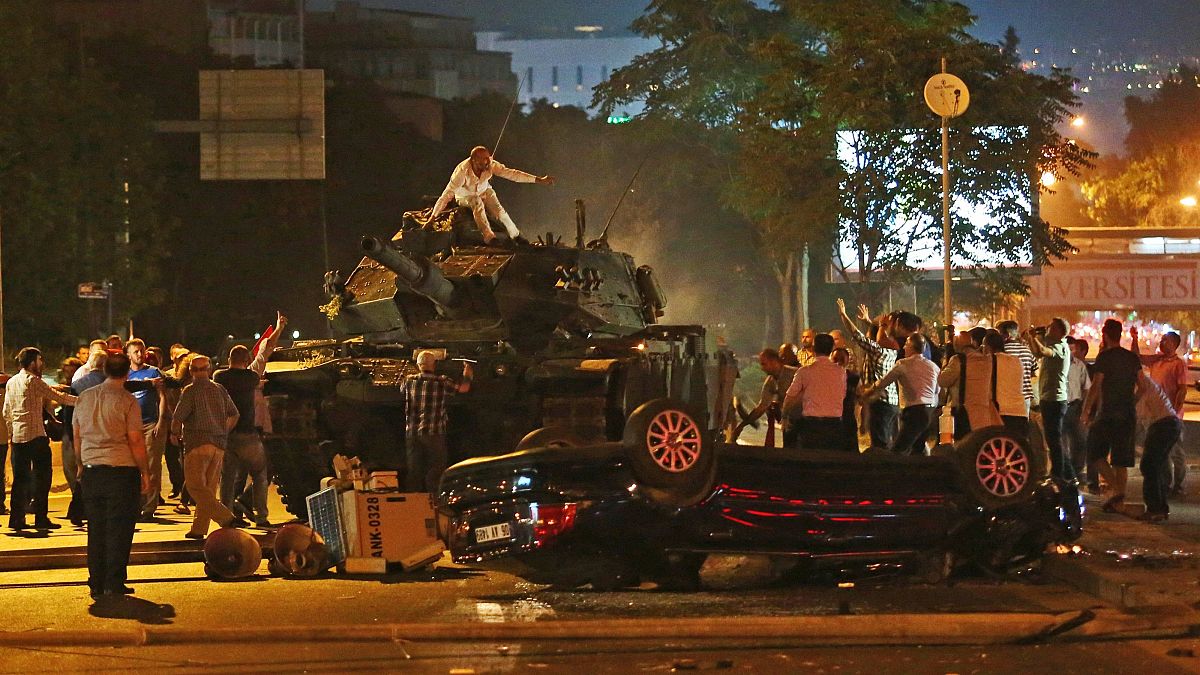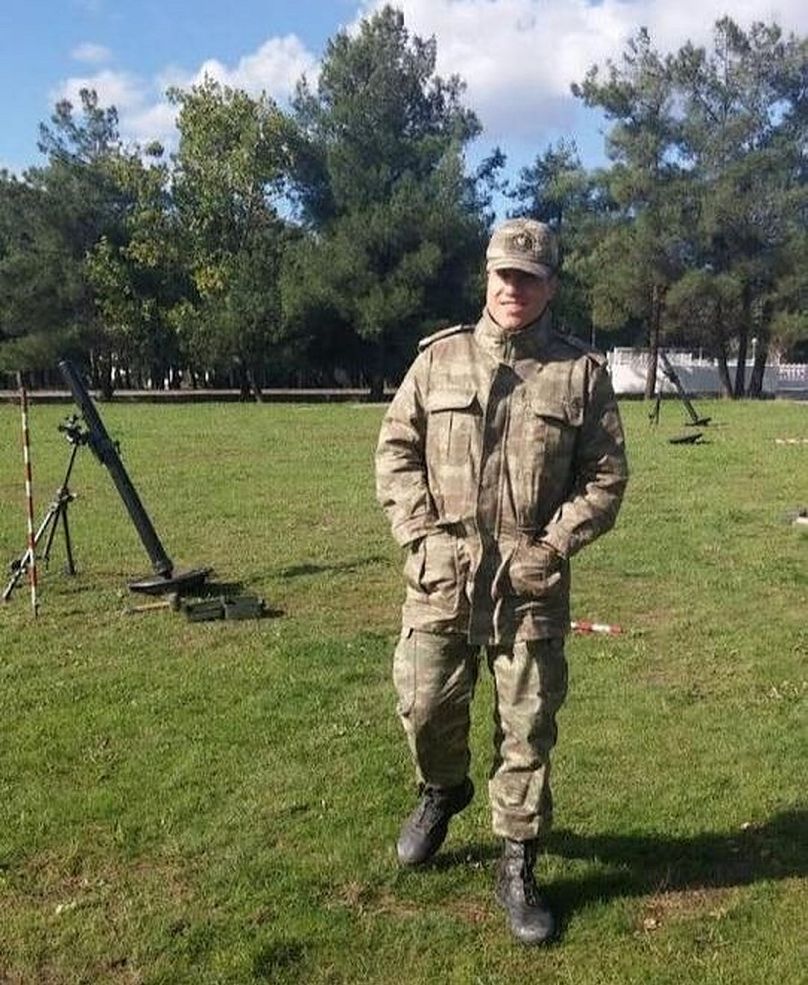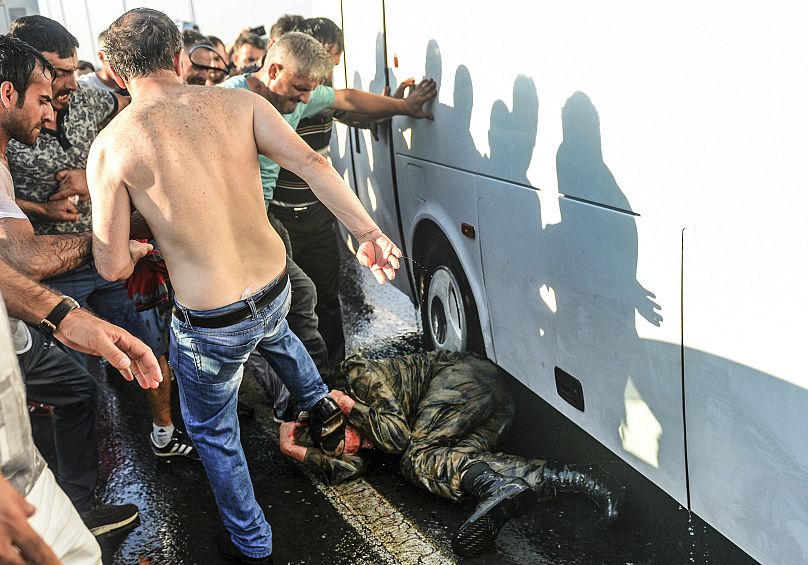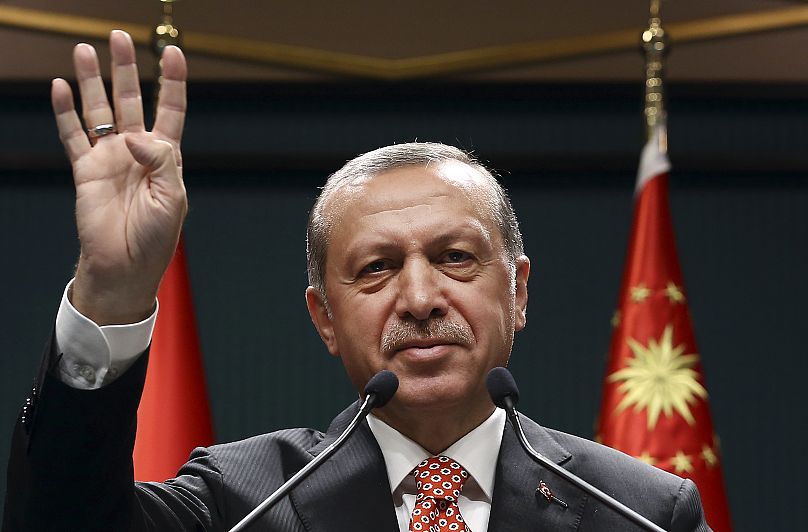An exiled Turkish soldier tells us what happened to him 4 years ago, during an attempted military coup in Turkey.
Four years ago, a military coup was attempted in Turkey. It failed, and the fallout led to tens of thousands of soldiers, police, and civil servants being dismissed or suspended from their jobs, and thousands jailed.
A photo published in a Turkish newspaper shows rows of men partially stripped, hands bound behind their backs, kneeling in a horse stable after they were detained by police. Among them was Lt. Muhammed Emin Gundogdu, who had been attending a training course in the capital Ankara on the night of the coup.
Now in Germany, he has shared his story for the first time in an exclusive interview with Euronews.
Failed coup
On July 16, 2016, thousands of Turkish soldiers were arrested and brought to various locations around the country after the failed coup d’état which began the previous night.
The July 15 coup attempt resulted in the deaths of 251 people, and 2,200 were injured. The Turkish government accused the Gulen movement (a Muslim group led by US-based cleric Fethullah Gulen) of being behind the attempt, labelling them the "Fethullah Terrorist Organization" (FETO).
Since the failed coup, more than 500,000 people have been detained, according to a government source, and more than 150,000 have been dismissed from their jobs. Many thousands have fled the country, including security officers, judges, prosecutors, public servants, teachers, academics, and journalists. Soldiers and military cadets, some as young as 17, were captured and imprisoned. Many have received life sentences.
On July 15 Muhammed Emin Gundogdu, then 23, had packed his bags and was preparing a trip home to visit his family when his commander Muhlis Kocak sent a message on a WhatsApp group announcing a mandatory night training session that evening. Gundogdu cancelled his planned trip.
"Our commander never showed up that night,” he says. At the training, they were briefed on a potential terrorist attack and provided with live ammunition, unlike in previous training.
The soldiers wondered whether they were under attack by the so-called Islamic State, or other radical groups.
They were then dispatched to various locations. Forty were sent to President Recep Tayyip Erdogan’s presidential palace and assigned to protect him.
Those soldiers were positioned at the Gendarmerie Command base, opposite the palace, and later accused of attempting to kill the president, says Gundogdu.
Among the 36 “putschists” killed that night were Gundogdu’s friends Abdulkadir Karaagac and Ramazan Erdogan. They died believing they were defending the presidential palace, according to Gundogdu.
The government refused to give information about Karaagac's body to his family. After 15 days, they located it in a tent on the campus of a forensic unit.
“They called him a traitor, even though he was one of the best people I have known in my life,” says Gundogdu. After being denied permission to bury their son in the local cemetery, Karaagac’s family buried him on a mountain, in an unmarked grave.
In another case, 21-year-old cadet Murat Tekin was beaten to death by an angry civilian mob in Istanbul after civilians came out to defend the government.
On the night of July 15, Gundogdu was tasked with defending their Gendarmerie Guard Academy Command post that housed a large number of weapons, including tanks and helicopters.
He says they only learned about a military coup against the Erdogan government later when Prime Minister Binali Yildirim made an announcement on television around 11 pm.
“We were not allowed off the base. I thought our commanders were anti-coup.”
Around 1 am, after nothing happened on the base, the soldiers retreated to their dormitories. Gundogdu says he slept for a few hours before being awakened by the sound of gunshots around 6 am.
“Colonel Veli Tire and ten of his men threatened to shoot anyone trying to leave the base,” he recalls.
Then Gundogdu's Commander Kocak appeared, pointing his rifle at the soldiers. When no one responded, the commander put his gun down, sat with the men and told them that a group of soldiers had attempted a coup.
Gundogdu says the soldiers insisted they weren't involved, after which he says they were detained.
Stripped, beaten and jailed
“We were 300 men, fully armed, being detained by 10 men with only pistols, but we did nothing. We followed instructions.”
As there weren’t enough handcuffs for 300 soldiers, Gundogdu says they helped by handcuffing each other with their own bootlaces. He says they were reassured that everything would be cleared up at the police station and that they would soon be released.
Instead, they were transferred to a horse stable in Ankara, where they were made to undress and kneel in rows.
He says the place was filthy and the smell was nauseating.
“They forced us to use the place where we were sleeping as a toilet."
Gundogdu reports that everyone was being beaten and tortured. They were also photographed.
“I had bruises on my wrists from the tight handcuffs. We had to go to the bathroom, handcuffed, eat with handcuffs.” He says his hands turned purple from lack of circulation.
When they complained, one of the police officers told them: “You are traitors, be thankful you are still alive.”
An investigation by Amnesty International found that detainees were held for 48 hours in stress positions, denied food, water and medical treatment. “Turkish police verbally abused and threatened them and subjected them to beatings and torture, including rape and sexual assault.”
After two days in the stable, they were sent to another sports complex for four more days before being jailed for nine months in pretrial detention.
In 2018, Gundogdu says he was caught trying to escape from Turkey, resulting in 13 more months behind bars.
"They not only dismissed me from my post and jailed me, but also discriminated against me in society. They prevented me from having another job. My relatives cut off relations with me. Our neighbours verbally abused my family and me, calling us traitors.”
Escape to Germany
In January of this year, he managed to escape to Greece. From there, he traveled to Germany, where, according to the country's government agency for migrants and refugees (BAMF), he is among more than 39,000 Turkish nationals who have sought asylum there since 2016.
In June this year, the Turkish army dismissed another 4,562 personnel, taking the total number to 19,583, according to Defense Minister Hulusi Akar.
"Our aim is to purge terrorists from our ranks and not allow even a single traitor to wear this glorious military uniform," Akar said in a statement on June 3.
In court last week, a Turkish prosecutor recommended life imprisonment for Gundogdu. As evidence, he pointed to a WhatsApp message Gundogdu had sent on July 15, which read, “We don’t know anything. We are waiting at the entrance [of the base] armed and ready. Let’s not share anything from here.”
To date, Ankara has dismissed or suspended more than 45,000 police and military personnel and more than 130,000 civil servants, as well as a third of the judiciary, according to a report published this year by the US embassy in Turkey.
Gundogdu claims the coup attempt was a game devised by the government to "remove the obstacles before Erdogan's dictatorship."
He says he never wanted to leave Turkey but was left without a choice.
"I had no right to live a normal life in my country.”
This article was developed with the support of Journalismfund.eu (www.journalismfund.eu)



